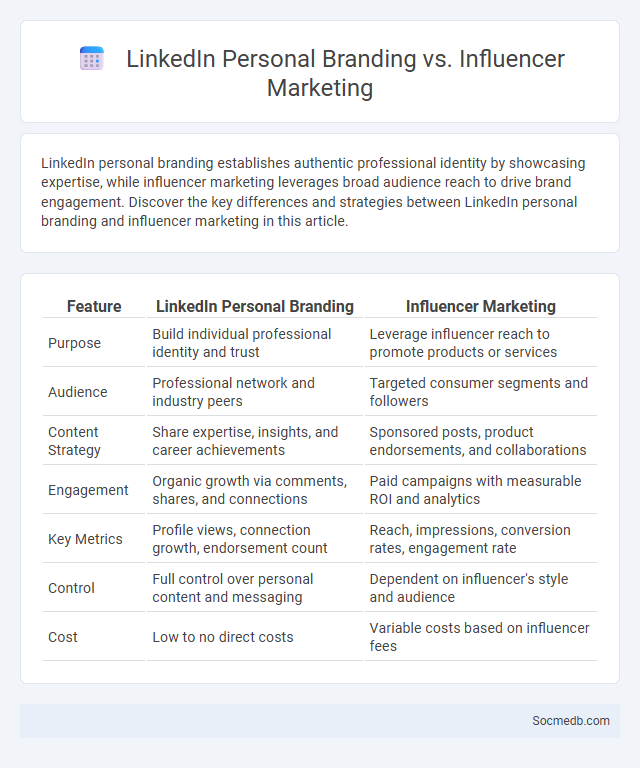
Photo illustration: LinkedIn Personal Branding vs Influencer Marketing
LinkedIn personal branding establishes authentic professional identity by showcasing expertise, while influencer marketing leverages broad audience reach to drive brand engagement. Discover the key differences and strategies between LinkedIn personal branding and influencer marketing in this article.
Table of Comparison
| Feature | LinkedIn Personal Branding | Influencer Marketing |
|---|---|---|
| Purpose | Build individual professional identity and trust | Leverage influencer reach to promote products or services |
| Audience | Professional network and industry peers | Targeted consumer segments and followers |
| Content Strategy | Share expertise, insights, and career achievements | Sponsored posts, product endorsements, and collaborations |
| Engagement | Organic growth via comments, shares, and connections | Paid campaigns with measurable ROI and analytics |
| Key Metrics | Profile views, connection growth, endorsement count | Reach, impressions, conversion rates, engagement rate |
| Control | Full control over personal content and messaging | Dependent on influencer's style and audience |
| Cost | Low to no direct costs | Variable costs based on influencer fees |
Introduction to LinkedIn Personal Branding, Influencer Marketing, and Personal Branding
LinkedIn Personal Branding allows you to showcase your professional expertise and network effectively by creating a compelling profile that highlights your skills, achievements, and unique value. Influencer Marketing leverages trusted personalities to amplify your message and reach targeted audiences, increasing credibility and engagement on social media platforms. Personal Branding combines consistent messaging and authentic content to establish your reputation, elevate visibility, and build lasting professional relationships online.
Defining LinkedIn Personal Branding
LinkedIn personal branding involves strategically crafting a professional identity that highlights unique skills, experiences, and values to attract employers, clients, and industry peers. Optimizing LinkedIn profiles with targeted keywords, engaging content, and consistent messaging enhances visibility and credibility within specific professional networks. This approach strengthens personal reputation, drives career opportunities, and supports long-term professional growth on the platform.
What is Influencer Marketing?
Influencer marketing leverages individuals with a strong social media presence to promote products or services to targeted audiences. These influencers create authentic content that resonates with their followers, driving brand awareness and engagement. Your brand can achieve higher trust and conversion rates by collaborating with influencers who align with your niche and values.
The Essence of Personal Branding
Personal branding on social media centers on creating a consistent and authentic identity that highlights unique values, skills, and expertise. Effective personal branding involves strategic content sharing, engagement with target audiences, and leveraging platform algorithms to maximize visibility and influence. Building a strong personal brand enhances professional opportunities, fosters trust, and cultivates a loyal community across networks such as LinkedIn, Instagram, and Twitter.
Key Differences: LinkedIn vs Traditional Personal Branding
LinkedIn emphasizes professional networking, showcasing your skills, achievements, and endorsements to attract career opportunities, while traditional personal branding relies heavily on in-person interactions and offline reputation building. Your LinkedIn profile acts as a dynamic, searchable portfolio accessible globally, contrasting with traditional methods that are often limited in reach and measurability. The platform's analytics and content-sharing tools provide real-time feedback and engagement metrics, enhancing how you tailor your professional identity versus the static nature of traditional personal branding.
Influencer Marketing vs Personal Branding: Main Contrasts
Influencer Marketing centers on leveraging influencers' large, engaged audiences to promote products or services, driving brand awareness and sales through authentic endorsements. Personal Branding emphasizes building Your individual reputation and unique identity to cultivate trust and long-term relationships with followers or clients. While Influencer Marketing depends on broad reach and third-party validation, Personal Branding focuses on direct audience connection and personal authority.
Benefits of LinkedIn Personal Branding for Professionals
LinkedIn personal branding empowers professionals to showcase their expertise, expanding their network with industry leaders and potential employers. It enhances visibility through targeted content, helping to establish authority and trust in specific fields. Consistent personal branding on LinkedIn drives career growth by attracting job opportunities, partnerships, and speaking engagements.
Building Trust: Influencer Marketing vs Personal Branding
Building trust through influencer marketing involves leveraging credible personalities to endorse your brand, which can quickly establish authority and reach a broad audience. Personal branding, on the other hand, focuses on authentic storytelling and consistent content that reflects Your unique voice and values, fostering deeper, long-lasting connections with followers. Combining both strategies maximizes trust by balancing widespread influence with genuine, personal engagement.
Choosing the Right Strategy for Your Career or Business
Selecting the right social media strategy involves analyzing your target audience's behavior and preferences across platforms like Instagram, LinkedIn, and Twitter to maximize engagement and brand visibility. Implementing data-driven content plans and leveraging tools like analytics dashboards ensures optimized ad spend and campaign performance. Consistent evaluation and adaptation to emerging trends and competitor strategies enable sustainable growth and stronger online presence.
Future Trends in Personal Branding and Influencer Marketing
Future trends in personal branding highlight the rise of AI-driven content customization and immersive experiences through augmented reality (AR), enabling influencers to create highly personalized and interactive connections with their audience. Micro and nano influencers will dominate influencer marketing strategies due to their higher engagement rates and authentic audience relationships, driving brands to invest more in niche communities and targeted collaborations. Data analytics and AI-powered tools will optimize campaign effectiveness, allowing precise audience segmentation and performance tracking, thereby shaping the next generation of digital influence.
 socmedb.com
socmedb.com